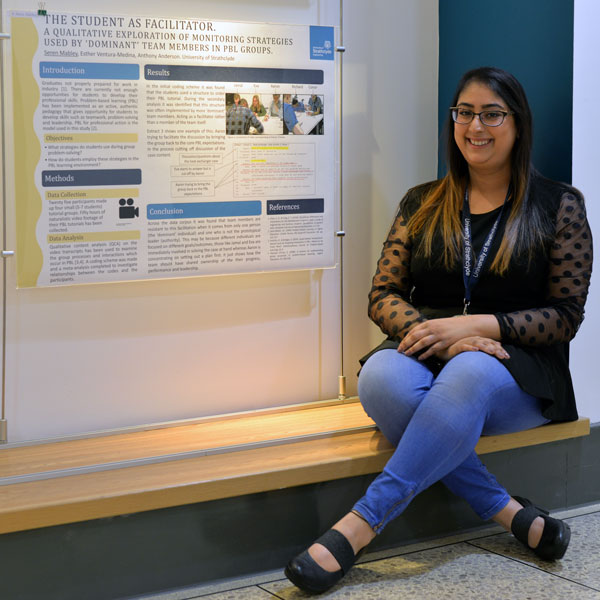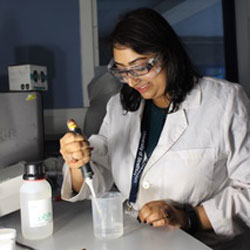Why did you choose Strathclyde for your postgraduate research study?
After I finished my master’s dissertation I really appreciated research work more and the level of dedication and effort that goes into a subject or project is something I've witnessed at Strathclyde. I really developed a love for the field of work I was researching in.
Strathclyde has so many valuable resources and so much support available that it equips you with all the necessary skills you need for the working world; be it in academia or in industry.
The friendly and supportive atmosphere really attracted me to stay on. I felt like Strathclyde has so much to offer. Over the years I've made so many memories and friends that I knew Strathclyde would be my first and only choice to pursue my PhD.
Tell us about the nature of your research.
My research focuses on how suspensions of solid colloidal particles in a fluid affect processes to cause a phenomenon known as 'Shear Thickening'. The most common example of this is cornstarch in water, also known as 'oobleck'. This simple mixture can exhibit such complex behaviour and it's due to this complexity that shear thickening systems attracts so much interest. Upon the application of a force, oobleck’s resistance to flow provides an idea of what type of suspensions processes need to deal with, and then allow for 'Jamming' to then be categorised.
The surface environment under which shear thickening and jamming is observed is where my research lies. By using understanding and techniques such as rheology and a novel method to characterise this behaviour, this study excites me to find out what results I obtain!
What do you like about your research area?
I appreciate that shear thickening systems can be found in all aspects of life, from the kitchen to streets and ketchup to quicksand. Industries my research can be applied to can range from ceramics and paint manufacture, to drilling muds in oil extraction. Fields and processes, including powder flows and slurries in chemical processes, formulation and manufacture of particle-based products such as foods and ceramics, are just some to name a few.
I enjoy that I can carry out in-depth research, and the hands-on laboratory work fills me with pride knowing that hopefully I can make a difference to these processes, and all aspects of life. I appreciate the practical aspect of my project, and the fact that what I work on has a real application – the work and data I do can actually be used somewhere.
What’s the Strathclyde research community like?
Vibrant and inclusive! The PhD community in my department is very supportive and you can discuss ideas, work with peers, and they can also provide valuable input. They always encourage new thoughts and we motivate each other to try things.
The PhD community in my department is extremely supportive. You can discuss ideas, work with peers and even provide input to each other’s work, even though people might not be working in the same field as yourself. There's a wide spectrum of topics researchers are working, and the collaboration of ideas helps a researcher to grow. There's always encouragement of new thoughts, not only in my department, but university-wide, within the research community - we're always trying to motivate each other.
Strathclyde also runs the Researcher Development Programme which helps researchers cultivate their skills through specialist workshops and activities. It's fantastic as it provides researchers with opportunities to enhance certain aspects of their research career. You're able to learn new things outwith your field of research and at the same time the classroom setting enables networking with fellow peers from different departments.
What are the Strathclyde facilities like?
There's a lot of high-tech equipment available to be used by researchers. These resources are valuable for researchers which aid in their studies.
Facilities such as the AFRC and Technology & Innovation Centre, to name just a few, are hubs for forward thinking research that provide quality research facilities such as laboratory and equipment, as well as high quality experts. The integration between departments and faculties means that the value of research is always being improved.
Strathclyde is well-known for providing help and support whenever it's needed. The library is fully equipped with all the necessary materials needed for all levels of studies, from undergraduates to academics. As well as studies, facilities like the Union holds a great atmosphere for social aspects and unwinding.
The careers service available here at Strathclyde is also one used by all. It's absolutely fantastic as it provides you with all the resources needed to equip you for the working world. Whichever level of PhD you're at, I'd thoroughly encourage the use of the amazing services they provide.
Tell us about the support from your supervisor and the wider Strathclyde team.
I've had so much support from my supervisor. If I have any ideas or thoughts my supervisor is always available to listen and provide creative and technical input where need be. He's very encouraging of the ideas I present while also allowing me to think independently and work out myself what I want to achieve and when.

What's the best thing about Strathclyde?
Strathclyde, being one of the top universities, has students from all around the world, with varying experiences. This makes studying at Strathclyde more enjoyable and has helped me learn and make great friends with people from all walks of life.
The dedication lecturers and staff show towards students is commendable and everyone in Strathclyde is friendly, supportive and helpful. The list goes on and on!
What would you like to do after your PhD?
There are so many avenues that I can explore using the research and skills from my PhD in both industry and academia. Shear thickening is a topic whose understanding can be applied to a lot of sectors and processes. This could be oil and gas, the cosmetics industry, food and drink, pharmaceuticals - the opportunities are endless and you're not just limited to one specific path.
At the moment, I'm hoping to continue working in or with my field of research in some way.


